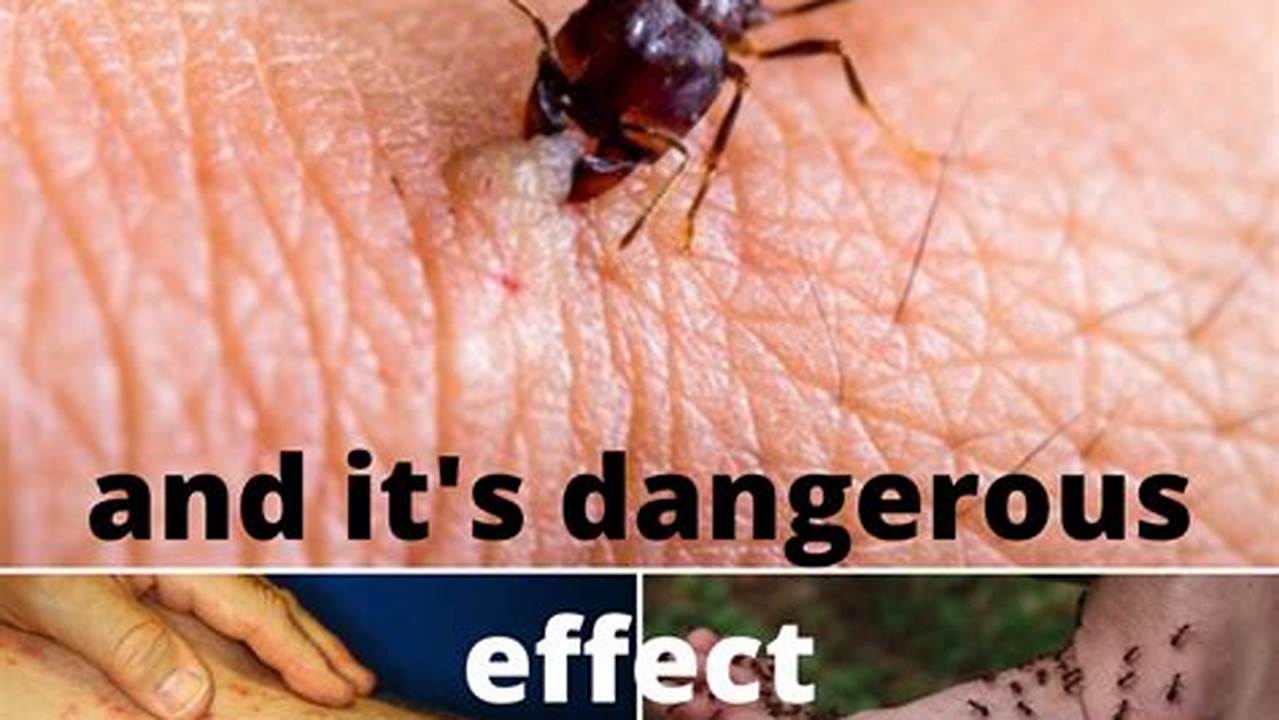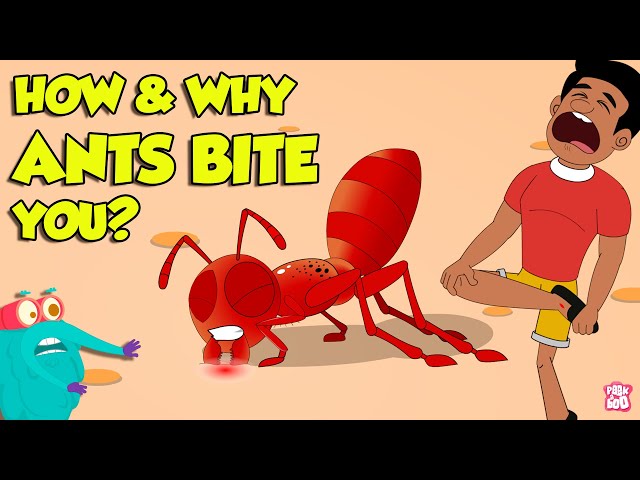
Ants are known for their ability to bite. While most ant bites are not dangerous to humans, some species can deliver a painful bite that may cause swelling, itching, and redness.
The severity of an ant bite depends on the species of ant and the amount of venom injected. Some of the most common ant species that bite humans include fire ants, carpenter ants, and harvester ants.
Fire ants are known for their aggressive behavior and painful bites. They are found in the southern United States and can be identified by their reddish-brown color and black abdomen. Carpenter ants are large, black ants that can cause damage to homes and other structures. They can also bite humans if they feel threatened. Harvester ants are found in the western United States and are known for their painful bites. They are reddish-brown in color and have long, slender mandibles.
Can Ants Bite
Ants are known for their ability to bite. While most ant bites are not dangerous to humans, some species can deliver a painful bite that may cause swelling, itching, and redness. The severity of an ant bite depends on the species of ant and the amount of venom injected.
- Species: There are over 12,000 species of ants in the world, and not all of them bite. Some of the most common ant species that bite humans include fire ants, carpenter ants, and harvester ants.
- Venom: Some ants inject venom when they bite. The venom can cause pain, swelling, and itching. In some cases, the venom can also cause more serious health problems, such as anaphylaxis.
- Location: Ants can be found all over the world, but they are most common in warm, humid climates. Ants can be found in a variety of habitats, including forests, grasslands, deserts, and urban areas.
- Behavior: Ants are social insects that live in colonies. Ants are typically not aggressive towards humans, but they may bite if they feel threatened.
- Treatment: Most ant bites can be treated at home with simple first aid. However, if you are bitten by an ant and you experience severe pain, swelling, or itching, you should seek medical attention.
Ant bites are a common problem, but they can be easily prevented. By taking a few simple precautions, you can reduce your risk of being bitten by an ant.
Species
The fact that there are over 12,000 species of ants in the world, and not all of them bite, is an important consideration when discussing “can ants bite.” It highlights the diversity of the ant population and the need to be specific when discussing the biting habits of ants.
For example, fire ants are known for their aggressive behavior and painful bites, while carpenter ants are more likely to bite if they feel threatened. Harvester ants, on the other hand, are known for their painful bites, but they are not as aggressive as fire ants.
Understanding the different species of ants and their biting habits is important for preventing and treating ant bites. By taking the time to learn about the ants in your area, you can take steps to reduce your risk of being bitten.
Venom
The connection between “venom” and “can ants bite” is significant because it highlights the potential health risks associated with ant bites. While most ant bites are not dangerous, some species can inject venom that can cause serious health problems.
For example, fire ants are known for their aggressive behavior and painful bites. The venom from fire ants can cause severe pain, swelling, and itching. In some cases, fire ant venom can also cause anaphylaxis, a serious allergic reaction that can be life-threatening.
Carpenter ants are another species of ant that can inject venom. Carpenter ant venom is not as potent as fire ant venom, but it can still cause pain, swelling, and itching. Carpenter ant bites are also more likely to become infected, which can lead to further health problems.
Harvester ants are another species of ant that can inject venom. Harvester ant venom is not as potent as fire ant or carpenter ant venom, but it can still cause pain, swelling, and itching. Harvester ant bites are also more likely to become infected, which can lead to further health problems.
Understanding the connection between “venom” and “can ants bite” is important for preventing and treating ant bites. By taking the time to learn about the ants in your area, you can take steps to reduce your risk of being bitten.
Location
The connection between “Location: Ants can be found all over the world, but they are most common in warm, humid climates. Ants can be found in a variety of habitats, including forests, grasslands, deserts, and urban areas.” and “can ants bite” is significant because it highlights the fact that the location of ants can affect their biting behavior. For example, fire ants are more common in warm, humid climates, and they are also more likely to bite humans than ants that live in other climates. Carpenter ants are more common in wooded areas, and they are more likely to bite humans if they feel threatened. Harvester ants are more common in deserts, and they are more likely to bite humans if they are disturbed.
Understanding the connection between “Location: Ants can be found all over the world, but they are most common in warm, humid climates. Ants can be found in a variety of habitats, including forests, grasslands, deserts, and urban areas.” and “can ants bite” is important for preventing and treating ant bites. By taking the time to learn about the ants in your area, you can take steps to reduce your risk of being bitten.
For example, if you live in an area where fire ants are common, you should take precautions to avoid being bitten. This may include wearing long pants and socks when you are outdoors, and avoiding areas where fire ants are known to nest. If you are bitten by a fire ant, you should wash the bite with soap and water and apply a cold compress to reduce pain and swelling.
By understanding the connection between “Location: Ants can be found all over the world, but they are most common in warm, humid climates. Ants can be found in a variety of habitats, including forests, grasslands, deserts, and urban areas.” and “can ants bite”, you can take steps to reduce your risk of being bitten by ants and to treat ant bites if they do occur.
Behavior
The connection between “Behavior: Ants are social insects that live in colonies. Ants are typically not aggressive towards humans, but they may bite if they feel threatened.” and “can ants bite” is significant because it highlights the fact that the behavior of ants can affect their likelihood of biting humans. For example, fire ants are known for their aggressive behavior and are more likely to bite humans than other species of ants. Carpenter ants are more likely to bite humans if they feel threatened, such as when their nest is disturbed. Harvester ants are more likely to bite humans if they are disturbed while they are foraging for food.
Understanding the connection between “Behavior: Ants are social insects that live in colonies. Ants are typically not aggressive towards humans, but they may bite if they feel threatened.” and “can ants bite” is important for preventing and treating ant bites. By taking the time to learn about the ants in your area, you can take steps to reduce your risk of being bitten.
For example, if you live in an area where fire ants are common, you should take precautions to avoid being bitten. This may include wearing long pants and socks when you are outdoors, and avoiding areas where fire ants are known to nest. If you are bitten by a fire ant, you should wash the bite with soap and water and apply a cold compress to reduce pain and swelling.
By understanding the connection between “Behavior: Ants are social insects that live in colonies. Ants are typically not aggressive towards humans, but they may bite if they feel threatened.” and “can ants bite”, you can take steps to reduce your risk of being bitten by ants and to treat ant bites if they do occur.
Treatment
The connection between “Treatment: Most ant bites can be treated at home with simple first aid. However, if you are bitten by an ant and you experience severe pain, swelling, or itching, you should seek medical attention.” and “can ants bite” is significant because it highlights the importance of understanding the potential health risks associated with ant bites and the appropriate steps to take in the event of a bite. While most ant bites can be treated at home, some bites can cause serious health problems, such as anaphylaxis, a serious allergic reaction that can be life-threatening.
-
Understanding the Symptoms of a Serious Ant Bite
It is important to be able to recognize the symptoms of a serious ant bite. These symptoms include:
- Severe pain
- Swelling
- Itching
- Anaphylaxis, a serious allergic reaction that can be life-threatening
If you experience any of these symptoms after being bitten by an ant, it is important to seek medical attention immediately.
-
First Aid for Ant Bites
If you are bitten by an ant and you do not experience any serious symptoms, you can treat the bite at home with simple first aid. Here are some tips for treating an ant bite:
- Wash the bite with soap and water.
- Apply a cold compress to the bite to reduce pain and swelling.
- Take an over-the-counter pain reliever, such as ibuprofen or acetaminophen.
If the bite becomes infected, you should see a doctor.
-
Preventing Ant Bites
The best way to prevent ant bites is to avoid contact with ants. Here are some tips for preventing ant bites:
- Be aware of your surroundings and avoid areas where ants are known to nest.
- Wear long pants and socks when you are outdoors.
- Use insect repellent containing DEET or picaridin.
- Keep your home clean and free of food debris.
By following these tips, you can reduce your risk of being bitten by ants.
The connection between “Treatment: Most ant bites can be treated at home with simple first aid. However, if you are bitten by an ant and you experience severe pain, swelling, or itching, you should seek medical attention.” and “can ants bite” is a critical one. By understanding the potential health risks associated with ant bites and the appropriate steps to take in the event of a bite, you can protect yourself and your loved ones from serious harm.
Frequently Asked Questions about Ant Bites
Ant bites are a common problem, but they can be easily prevented and treated. Here are some frequently asked questions about ant bites:
Question 1: Can all ants bite?
Answer: No, not all ants bite. There are over 12,000 species of ants in the world, and only a small number of them are known to bite humans. Some of the most common ant species that bite humans include fire ants, carpenter ants, and harvester ants.
Question 2: Are ant bites dangerous?
Answer: Most ant bites are not dangerous, but some species can inject venom that can cause pain, swelling, and itching. In some cases, the venom can also cause more serious health problems, such as anaphylaxis, a serious allergic reaction that can be life-threatening.
Question 3: How can I prevent ant bites?
Answer: The best way to prevent ant bites is to avoid contact with ants. Here are some tips for preventing ant bites:
- Be aware of your surroundings and avoid areas where ants are known to nest.
- Wear long pants and socks when you are outdoors.
- Use insect repellent containing DEET or picaridin.
- Keep your home clean and free of food debris.
Question 4: What should I do if I am bitten by an ant?
Answer: If you are bitten by an ant, wash the bite with soap and water. Apply a cold compress to the bite to reduce pain and swelling. Take an over-the-counter pain reliever, such as ibuprofen or acetaminophen. If the bite becomes infected, see a doctor.
Question 5: When should I seek medical attention for an ant bite?
Answer: You should seek medical attention if you experience severe pain, swelling, or itching after being bitten by an ant. You should also seek medical attention if you experience any signs of an allergic reaction, such as difficulty breathing, hives, or swelling of the face, lips, or tongue.
Question 6: How can I treat an ant bite at home?
Answer: Most ant bites can be treated at home with simple first aid. Wash the bite with soap and water. Apply a cold compress to the bite to reduce pain and swelling. Take an over-the-counter pain reliever, such as ibuprofen or acetaminophen. If the bite becomes infected, see a doctor.
Summary of key takeaways or final thought:Ant bites are a common problem, but they can be easily prevented and treated. By understanding the different species of ants and their biting habits, you can take steps to reduce your risk of being bitten. If you are bitten by an ant, wash the bite with soap and water and apply a cold compress to reduce pain and swelling. Take an over-the-counter pain reliever, such as ibuprofen or acetaminophen. If the bite becomes infected, see a doctor.
Transition to the next article section:Now that you know more about ant bites, you can take steps to protect yourself and your loved ones from these pests.
Tips to Avoid Ant Bites
Ant bites are a common problem, but they can be easily prevented. Here are some tips to help you avoid ant bites:
- Be aware of your surroundings. Ants are attracted to food and water, so be sure to keep your surroundings clean and free of food debris. Pay attention to where you are walking and avoid areas where ants are known to nest.
- Wear protective clothing. When you are outdoors, wear long pants and socks to protect your skin from ant bites. You may also want to wear gloves if you are working in the garden or doing other activities that could bring you into contact with ants.
- Use insect repellent. Insect repellent containing DEET or picaridin can help to deter ants from biting you. Be sure to apply insect repellent to all exposed skin before going outdoors.
- Keep your home clean. Ants are attracted to food and water, so it is important to keep your home clean and free of food debris. Be sure to clean up spills immediately and store food in airtight containers.
- Seal up entry points. Ants can enter your home through even the smallest cracks or holes. Be sure to seal up any cracks or holes in your foundation, doors, and windows to prevent ants from getting inside.
- Eliminate ant nests. If you find an ant nest on your property, it is important to eliminate it as soon as possible. You can do this by pouring boiling water on the nest or using an ant bait.
- Call a professional. If you are unable to eliminate an ant infestation on your own, you should call a professional pest control company. A professional pest control company can safely and effectively eliminate ants from your home.
Summary of key takeaways or benefits:By following these tips, you can help to reduce your risk of being bitten by ants. Ant bites are a common problem, but they can be easily prevented. By taking a few simple precautions, you can protect yourself and your loved ones from these pests.
Transition to the article’s conclusion:Now that you know how to avoid ant bites, you can enjoy the outdoors without worry.
Conclusion
Ants are common insects that can be found all over the world. While most ant bites are not dangerous, some species can inject venom that can cause pain, swelling, and itching. In some cases, the venom can also cause more serious health problems, such as anaphylaxis, a serious allergic reaction that can be life-threatening.
Understanding the risks associated with ant bites is important for preventing and treating these bites. By taking a few simple precautions, you can reduce your risk of being bitten by an ant. If you are bitten by an ant, wash the bite with soap and water and apply a cold compress to reduce pain and swelling. Take an over-the-counter pain reliever, such as ibuprofen or acetaminophen. If the bite becomes infected, see a doctor.
Ant bites are a common problem, but they can be easily prevented and treated. By following the tips outlined in this article, you can protect yourself and your loved ones from these pests.
Youtube Video:



